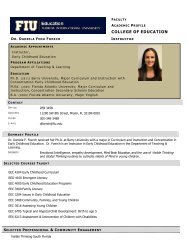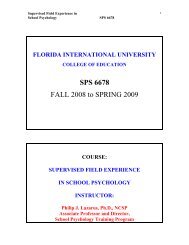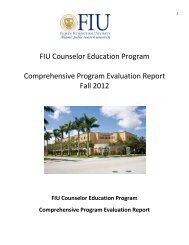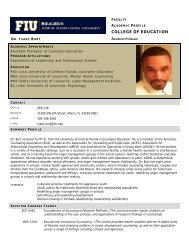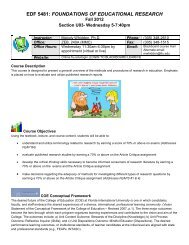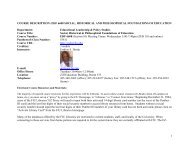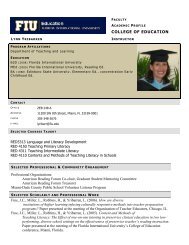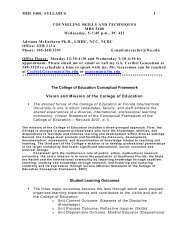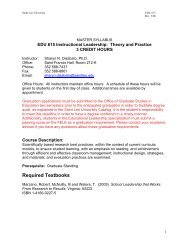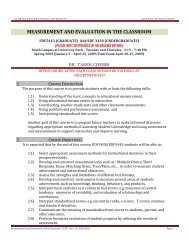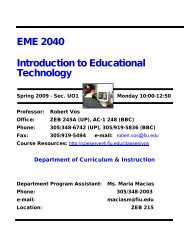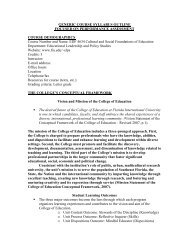2007 - College of Education - Florida International University
2007 - College of Education - Florida International University
2007 - College of Education - Florida International University
Create successful ePaper yourself
Turn your PDF publications into a flip-book with our unique Google optimized e-Paper software.
Band Queer: Lesbian and Gay Marching and Symphonic Bands and<br />
Transformative and Emancipatory Learning Experiences for Adults<br />
S<strong>of</strong>ia Bitela<br />
<strong>Florida</strong> <strong>International</strong> <strong>University</strong>, USA<br />
Abstract: Lesbian and gay marching and symphonic bands hold rich<br />
opportunities for adults to engage in transformative and emancipatory learning<br />
experiences.<br />
Transformative learning involves the transformation <strong>of</strong> an individual’s perspective after<br />
carefully considering the underlying beliefs and assumptions supporting the old perspective, a<br />
process known as critical reflection (Mezirow, 1998). Transformative learning encompasses a<br />
complex process whereby adults engage in active meaning-making and change how they see<br />
themselves and the world around them (Baumgartner, 2001). The process begins when a person<br />
experiences a disorienting dilemma, or a major event “a person experiences as a crisis” (Merriam<br />
& Caffarella, 1999, p. 321). Next, the stage <strong>of</strong> self-examination leads into thinking critically<br />
about the underlying beliefs, assumptions, and personal biases underlying a particular viewpoint.<br />
After wrestling with one’s thoughts and values, a person eventually reaches the stage in which<br />
perspective transformation takes place. Someone exploring his or her sexuality can come to<br />
terms with being gay, lesbian, bisexual, transgender, or queer (GLBTQ) through actively<br />
engaging in the transformative learning process (King, 2003). However, GLBTQ issues remain<br />
relatively invisible in the field <strong>of</strong> adult education (Grace & Hill, 2004; Hill, 2003, 2004; Rocco<br />
& Gallagher, in press).<br />
Emancipatory learning, sometimes considered a subset <strong>of</strong> transformative learning (Olson,<br />
2005), follows the same intellectual process as transformative learning. Emancipatory learning<br />
explicitly seeks social change to correct injustice as a primary goal (Imel, 1999). However, it<br />
moves beyond the scope <strong>of</strong> individual perspective transformation and seeks instead the<br />
transformation <strong>of</strong> a group <strong>of</strong> people and ultimately, society (Gordon, 1993; Welton, 1993).<br />
Emancipatory learning, or liberatory learning, seeks to release individuals, groups, and society<br />
from assumptions and perspectives that keep individuals marginalized and disenfranchised. As<br />
people become free <strong>of</strong> these assumptions and beliefs, a more just and equitable society will<br />
evolve. Like the African American civil rights movement <strong>of</strong> the 1960s, the gay rights movement<br />
currently attempts to make great strides in gaining equal civil rights and legal recognition for the<br />
GLBTQ community (Graff, 2002). Undoubtedly, the gay rights movement <strong>of</strong> recent years<br />
provides important considerations for the role <strong>of</strong> emancipatory learning for adults.<br />
Spirituality can engage the learner more actively in the transformative and emancipatory<br />
learning processes by immersing the learner in the emotional experience <strong>of</strong> the event (Dirkx,<br />
1997, 2006; Tisdell, 1999; Tisdell & Tolliver, 2001). Dirkx (1997) states “denial <strong>of</strong> soul within<br />
the learning environment is denial <strong>of</strong> a life force” (p. 85). The GLBTQ Christian community<br />
acknowledges the role <strong>of</strong> music in providing spiritually satisfying experiences whereby music<br />
gives hope to the oppressed and induces joy (Anderson, 2005; Chellew-Hodge, 2005), actively<br />
celebrating this life force. Music educators mostly consider the community-building aspect <strong>of</strong><br />
adult music groups (Foster, 2000; LeCroy, 1998), although Mark (1996) addresses the role <strong>of</strong><br />
Bitela, S. (<strong>2007</strong>). Band queer: Lesbian and gay marching and symphonic bands and transformative and<br />
emancipatory learning experiences for adults. In S. M. Nielsen & M. S. Plakhotnik (Eds.), Proceedings <strong>of</strong><br />
the Sixth Annual <strong>College</strong> <strong>of</strong> <strong>Education</strong> Research Conference: Urban and <strong>International</strong> <strong>Education</strong> Section<br />
(pp. 1-6). Miami: <strong>Florida</strong> <strong>International</strong> <strong>University</strong>. http://coeweb.fiu.edu/research_conference/



